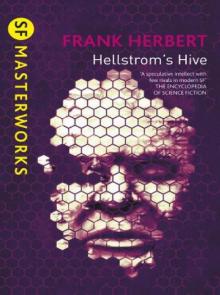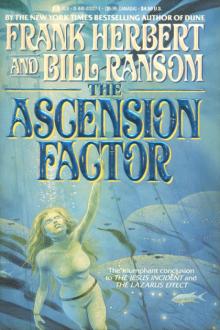- Home
- Frank Herbert
Four Unpublished Novels Page 3
Four Unpublished Novels Read online
Page 3
Chalk up another averted face; a lovely, cleverly averted face. Cecelia Lang.
His new address was so far back in the Warrens of the river flat that the Transport was almost empty when they neared it. Movius watched the corner numbers, stood up when they passed 8,000. A man’s voice whispered hoarsely behind him, “I’ll bet he has a cute little LP out here he doesn’t want his driver to know about.”
Movius became acutely conscious of the color of his clothing, the T above his lapel number. Even without these things he knew there would be something in his manner to brand him High-Opp. How long would it take for that to wear off?
The Transport stopped. Movius stepped down. Forty-seven was four blocks away along a curving street filled with screeching LP children who grew quiet as he approached, stared silently as he passed. An occasional woman sat on a doorstep staring at nothing. Where the privileged sections rarely heard loud noises, quiet was the exception here—until the workers came home and fell into weary sleep. Even then sounds filtered through the night: giggles, screeches, curses. And the smell. A fetid notice of unwashed closeness. Movius walked through it as though in a dream, hearing his heels click against the concrete, remembering his childhood in a Warren such as this, conscious of the eyes which followed him.
It was a building like all the others—lifeless windows and a door like a gaping mouth. A Warren. How long had it been? Eleven years? No. Twelve years. Great Gallup! Twelve years! Since the day he’d made the Calculation Corps, that breeding ground of the middle ranks. That was where he’d met Phil Henry. They had been two eager beginners. Eager to learn. Eager to believe anything good about a system which gave them this tremendous opportunity. He wondered how much Phil Henry still believed. Then there was Phil’s offer. The Computer Section; it was only four stages above LP and fourteen ranks from the top. A few privileges. Better housing. Pride held him back, the memory that he’d not seen Phil for almost a year, had ignored an old friend. Yes, Phil was a friend. No face averted there. Later on he’d look up Phil. Not now.
A thought came back to him: Comp Section, fourteen ranks from the top. Had he been aiming for the top? He realized with a shock that something in him had been doing just that, something unconscious and driving. And all the while his conscious self had moved along placidly like a passenger in a commuter tube deep under the earth.
A gang of children raced between Movius and the Warren, ran off down the street shouting.
There was the Warren. His Warren. He was back to the beginning now; nothing to do but wait until his various talents went through the sorter, came up with an open job. That took time. Maybe a month; maybe more. He didn’t look forward to wearing the LP’s on his lapels, having old acquaintances appear not to notice. Well, inside then; off the streets.
He found room ninety, paused outside the door. He could picture it, identical to the one in his memory—seven by nine feet, narrow bed, standard bedding, a bathroom three and one-half feet square (shower opposite toilet, washbasin under shower, just enough room to stand erect), beside the bathroom a closet of the same size. Three and one-half goes into seven twice and seven feet is the Opinion-prescribed width of a standard bachelor room. The plastic walls with their memorized pipes and conduits subtracted perhaps three-quarters of an inch.
May the Majority rule!
Movius opened the door, drew back when he saw a strange woman sitting on the bed, a small grey mouse of a woman with sallow complexion and hair drawn back tightly in a worker’s bun. “I’m sorry,” he said. “I thought this was my room. The door …”
She jumped up, held out a sheet of paper, said, “Darling, I couldn’t stay away any longer. I had to see you.”
This is a joke, thought Movius. He noted a stack of Transport Department moving boxes in a corner, one on the bed. His?
“Please come in. Don’t be mad at me.” She beckoned to him frantically.
Movius put down the briefcase, closed the door. The click of the door roused him and he started to re-open it. She shook her head violently, waved the paper at him. “Darling, what’s wrong?” she demanded. “Are you tired of me already?”
He moved forward, accepted the paper, read it. The words took a while coming through because the woman went on rambling about her passion for him and the cruelty of men. It was neat block printing; “Do not say a word aloud. We may be overheard. You are in terrible danger. Come to the bed, pretend you are making love to me.”
When she was certain he had read the entire message, she grabbed it from him, crammed it into her mouth, chewed it and swallowed it with a convulsive gulp. She took his hand, dragged him to the bed, put her mouth close to his ear. “Say something, you fool,” she whispered. “Don’t you know what to say to a woman?”
He found the anger inside him where shock had hidden it. More people pushing him around! He jerked her to him, hissed in her ear, “Who are you? What’s the meaning of this?”
“I’m Grace London, Navvy’s sister. He sent me as soon as he found out. Pay close attention. You’re to be transferred to the Arctic Labor Pool for weather survey.”
Her eyes made him uncomfortable, staring at him so queerly. This obviously was more grapevine poppycock! But he remembered the accuracy of Navvy’s other prediction. It was as though the thought opened a door on the Arctic, letting in a blast of icy air. “That’s penalty service,” he whispered, subdued. “High mortality.” Roper’s name! Had they read his angry thoughts?
“Oh, darling, I’m so happy you’re not mad at me,” she said. “Kiss me again.” She made a low smacking around with her lips, bent and whispered, “It will be discovered too late. A big mistake. So sorry. Eulogies for poor dead Mr. Movius. Posthumous restoration of rank.”
A dead High-Opp, he thought. Her mood of urgency began to creep through his numbness. He muttered, “Darling, I’ve missed you, too.” He moved to make the bedsprings squeak, whispered, “Why?”
“No time for explanations,” she whispered and blushed as he again squeaked the springs. “Do exactly what I say. After I’ve gone, wait for darkness, then go out and catch a Commerce Transport. Ride it to the end of the line and go into the Carhouse. Find Clancy in the office. He’ll give you the keys to his locker, a change of clothes and instructions where to go from there.” She squeezed his hand, said in a loud, clear voice, “Darling, why don’t you come to my place tonight? This is too open here.” The springs protested as she stood.
Still in a semi-fog, he arose, watched her open the door, glance up and down the hallway, duck out.
The air held the charged feeling of static electricity after she had gone. As the mood of it melted away, he felt let down, unsure. Pop-mag pap! he thought. Who’d want to spy on a bachelor room in a Warren? And that nonsense about the Arctic Labor Pool. Mistakes like that just weren’t made.
But he had been low-opped. And the official question, when put to closer scrutiny, appeared to have been phrased toward that end. “For tax economy reasons!” But who would want to spy on … Then he remembered. A privilege of the top five ranks was an apartment in a building where freedom from spy beams was maintained by a master scrambler on the roof. A High-Opp phone could not be tapped for the same reason. He’d been living away from this sort of thing for too long. Bu-Con was always spying on the Warrens, looking for Sep activity.
Movius cleared the box off the corner of his bed, lay back. Navvy had sent his sister. Sometimes drivers were unaccountably loyal. He’d had more freedom than most drivers, too. Birthdays off, personal trips. Now, maybe Navvy was returning the favor.
The bed felt hard, uncomfortable beneath him, more like a gymnasium mat than a bed. Gymnasium! He’d lost his privilege card for the gymnasium. No more sessions on the mat with Okashi, no more steam baths, no masseuse. No more of anything that had made his life bearable. They’d even take his library permit for the reserved stacks. Back to the apathy of the Warrens.
What have I come to? he wondered. Climbing up through the bureaus and departments was enough
once. The competitive game. In fact, as he thought about it, that was all there had been. Pay attention to the game, live by the rules, believe the rules. Looking at his world now was like awakening after the loss of a pair of dark glasses which had obscured his vision.
Cecelia and Helmut!
He pounded a fist against the bed until it hurt. Cecelia had been an expensive trinket, a badge of office.
The Red Slip. Opinion SD22240368523ZX.
Almighty Opinion!
The full import of his loss began to come through to his consciousness. He caught himself sighing, felt like a shell vacuumed of everything but weary resentment.
Navvy had sent his sister. Navvy was right this morning. Is he right this time? What am I going to do? The question conjured up a vision of Movius’ father. “Never ask what you’re going to do, son. Ask how you’re going to do it.” Ah, yes. His positive father, full of history, discipline and good intentions gone astray. A history teacher in an age which sought to forget its own past, living out his life as a common laborer in the LP Warrens, ladling the knowledge of remembering contraband books into his son.
His father had started him on this road. The old man had died when Movius was twenty, the year he’d made the Calculation Corps. He couldn’t remember his mother. She had died in the educator purges. “The people must have a scapegoat, Dan. Give them their own knowledge to fight. Laugh while they destroy their salvation!” That was his father again; his father in the bitter mood, showing the growing son how to adopt protective coloration: “Act dumb when you’re with the dumb; act smart when you’re with the smart. But never act more intelligent than the man above you.”
The old man had taught too well.
Movius twisted on the bed. Damned low-opp mattress!
Where had it all begun? Ah, the history books again, the forbidden, hate-provoking history books. Low-opped all! It had started in the Twentieth Century with polls to predict the outcome of the crude elections of that era. Sampling methods were improved for almost a century during which emphasis on the sample poll became greater and greater.
Then along came Julius Stackman, born in the Twenty-First Century, following the wars which ended in world government. Stackman and his queer mind which linked a series of electronic relays into the Brownian Movement Regulator. Absolute random.
Give the machine a job: Supply a nine-digit code number for every responsible adult of age sixteen or over. Next, select three numbers. Every person in the world with those three numbers repeated in his code and in that series step up to a registration kiosk. Give code number, name and thumbprint. Click, click, click, click. Answer the question, please. If you don’t register and answer and you haven’t an adequate excuse, off you go the Arctic Labor Pool or the Sewer Maintenance Gangs. Who wants to be in the ALP or the SMG? Better to get up from your sickbed, answer the question. Register your opp.
Unless you happen to know somebody in the Very-High-Opp.
“Bill was with me. Official business.”
You might also know somebody in the Seps, too, who could get you a rubber stamp of your thumbprint. Then a friend could register your opp. But this method wasn’t well known.
Give the machine a job!
“What would be an absolute formalization of randomness?”
Out of this came the Mathematics of Impellation, reducing the so-called “laws of chance” to a set of usable factors and reducing the correlative error in a sample-poll to something negligible.
All of this from the square root of minus one.
And more, too. For a time there was a boom in small hand computers for games such as chess. The computers showed the optimum move under any set of conditions. With both players using them, it became evident that the person making the first move always won. A few purists barred the computers, but they were always running into flashy winners with hidden computers. Interest died. Almost fifty years passed before the invention of a new type of game based on Rorschach cards. The ink blots elicited strictly personal reactions under which the rules of the game changed. Formalization was loose. Some people still played these games. Nathan O’Brien of Bu-Psych was an expert.
They gave the machine the job and the machine became the government.
There developed around the poll-taking function a hierarchy of bureaus—The Bureau of the Census (Bu-Sen), The Bureau of Opinions (Bu-Opp), The Bureau of Questionnaires (Bu-Q), The Bureau of Control (Bu-Con), The Bureau of Information (now Bu-Blah even in its own halls), The Bureau of Psychology (Bu-Psych), The Bureau of Transportation (Bu-Trans), The Bureau of Communication (Bu-Comm) and on top of the pyramid, The Bureau of Coordination (The Bureau).
All were handmaidens to the Stackman Selector.
Not to mention Com-Burs, the committee made up of the chiefs of the twenty-five top bureaus. Com-Burs framed the questions. Bu-Q passed on the questions. BIG RUBBER STAMP. Bu-Opp filed away the answers which were then laws.
May the Majority rule.
Always spell Majority with a capital M.
Strange how the top jobs became family property. Helmut Glass was the fourth of his family to be The Coor. Occasionally he stepped down for another bureau chief, allowed the man to serve a year. Even The Coor has to have a vacation.
At the Bureau of Communication, in a small room just under the transmission tower, a man would punch out the code numbers and question.
“Code 449:
“Is compulsory teaching of any subject an invasion of privacy?”
A straightforward question. Speaks right out like a man. But look at those pushbuttons: “compulsory” and “invasion of privacy.”
“No man’s going to tell me to do something I don’t want to do!”
Tick, tick, tick, tick, tick into the Computer Section of Bu-Opp. Yes, yes, yes, yes, yes, yes, yes, yes, yes, yes, yes, yes, yes, no (kick out his number for investigation; lotta Seps around Paris), yes, yes, yes, undecided, yes, yes …
File it away in the master retainers. It’s a law now. Opinion RE40407770877TX: No education subject may be compulsory.
Compulsory teaching of Semantics? Low-opp!
“Well then we’ll just offer the classes for whoever wants them.”
Semantics teaches that words can dispose a man to think in a certain manner, that they can compel his thinking. Low-opped.
“We’ll set up a counseling service: How to Keep People From Influencing You.”
This is Semantics under another name. Negative compulsion. Low-opped.
Sixty-one thousand new recruits for the penalty services. A few escaped by public denunciation of their teachings. Quilliam London was one of these. When the carefully prepared riots came, his wife and older daughter did not escape.
Side effects crept into the system—forced conformity. If the Majority rules, there must be standardization. Standard clothing, standard buttons, standard decorations, standard cosmetics, standard housing, standard entertainment, standard foods.
Portland, Maine, to Peshwar. STANDARD.
And there were some slip-ups. The year the Bureau of Research tried to get a grant for the development of space flight they ran into a Coor who was a religious fanatic. A great uncle of Helmut Glass.
“If the Lord wanted us gallivanting all over the universe, he’d have given us wings. We’ll put it to the question.”
And there was a big row, but the question had spoken of bringing back strange diseases, of calling down the wrath of God.
There it was in the Bu-Opp files. Opinion CG819038331BX: It is forbidden that man may plan, devise or manufacture any machine intended for transporting humans to any other heavenly body.
“See the mail rocket, Junior. With about thirty days of work it could take ten men to the moon and back.”
“Why don’t they do it then?”
“Low-opped.”
“Oh.”
Standard gravitational attraction of the planet Earth.
Only the people were not standard. In their standard beds they continued t
o produce humans of odd shapes and sizes and colors. The last stronghold of non-conformity: the standard bed.
Perhaps there was another holdout, too. The language.
High-Opp and Low-Opp were part of the lexicon and all of the derivations thereof. The terms were not always complimentary. A High-Opp could be a person who held a position he didn’t deserve. To High-Opp a person could mean to take advantage of him. A Low-Opp was a person of little worth. To Low-Opp a man could mean to do a man an evil turn or to reduce him in rank. And always in this definition was the implication that the low-opp was by foul means.
Then there were the statuettes. They seemed to appear out of nowhere. Obscene statuettes labeled High-Opp and Low-Opp. Bu-Con was always making raids, uncovering stores of them, sending someone off to the ALP. Still the evil little plastic objects kept appearing.
“Where do they get the materials? Why do they do these things? The State takes care of their needs. (The barren demands of survival.) They have everything they could possibly want. (Their dreams, their Festivals, their two percentum beer, their standard beds. Not to forget the plastic with which to make obscene statuettes.) It’s just perversity!”
Let them eat cake!
But she got her head chopped off.
“What do they want now?”
Let them read the ancient books.
“Don’t be a fool!”
The scramble in the middle ranks was for privileges, for extra personal possessions, symbols of power. An extra rung on the ladder and what went with it.
Meet Daniel Movius, scrambler. Listen to him.
Low-opped.

 Direct Descent
Direct Descent The Ascension Factor
The Ascension Factor The Heaven Makers
The Heaven Makers Children of Dune
Children of Dune Old Rambling House
Old Rambling House Dune
Dune The Worlds of Frank Herbert
The Worlds of Frank Herbert The Jesus Incident
The Jesus Incident Heretics of Dune
Heretics of Dune Whipping Star
Whipping Star Dune Messiah
Dune Messiah Man of Two Worlds
Man of Two Worlds The Book of Frank Herbert
The Book of Frank Herbert Hunters Of Dune
Hunters Of Dune The Tactful Saboteur
The Tactful Saboteur Soul Catcher
Soul Catcher God Emperor of Dune
God Emperor of Dune The White Plague
The White Plague The Green Brain
The Green Brain The Godmakers
The Godmakers Sandworms of Dune
Sandworms of Dune Destination Void
Destination Void The Dosadi Experiment
The Dosadi Experiment Eye
Eye High-Opp
High-Opp The Eyes of Heisenberg
The Eyes of Heisenberg Missing Link
Missing Link Hellstrom's Hive
Hellstrom's Hive Chapterhouse: Dune
Chapterhouse: Dune The Santaroga Barrier
The Santaroga Barrier The Dragon in the Sea
The Dragon in the Sea Operation Haystack
Operation Haystack A Thorn in the Bush
A Thorn in the Bush Four Unpublished Novels
Four Unpublished Novels Dune dc-1
Dune dc-1 Jorj X. McKie 1 - Whipping Star
Jorj X. McKie 1 - Whipping Star DV 4 - The Ascension Factor
DV 4 - The Ascension Factor Frank Herbert - Dune Book 4 - God Emperor Of Dune
Frank Herbert - Dune Book 4 - God Emperor Of Dune ChapterHouse: Dune dc-6
ChapterHouse: Dune dc-6 The Ascension Factor w-4
The Ascension Factor w-4 A Game of Authors
A Game of Authors Children of Dune dc-3
Children of Dune dc-3 Destination: Void: Prequel to the Pandora Sequence
Destination: Void: Prequel to the Pandora Sequence The Collected Stories of Frank Herbert
The Collected Stories of Frank Herbert Dune Messiah dc-2
Dune Messiah dc-2 Frank Herbert - Dune Book 5 - Heretics of Dune
Frank Herbert - Dune Book 5 - Heretics of Dune DV 3 - The Lazarus Effect
DV 3 - The Lazarus Effect The Jesus Incident w-2
The Jesus Incident w-2 The Lazarus Effect w-3
The Lazarus Effect w-3 Frank Herbert
Frank Herbert The Ascension Factor: Pandora Sequence
The Ascension Factor: Pandora Sequence Dune (40th Anniversary Edition)
Dune (40th Anniversary Edition) The Dosadi Experiment c-2
The Dosadi Experiment c-2 The Lazarus Effect
The Lazarus Effect God Emperor of Dune dc-4
God Emperor of Dune dc-4 The Pandora Sequence: The Jesus Incident, the Lazarus Effect, the Ascension Factor
The Pandora Sequence: The Jesus Incident, the Lazarus Effect, the Ascension Factor The Green Brain (v4.0)
The Green Brain (v4.0) The Heaven Makers (v4.0)
The Heaven Makers (v4.0) Heretics of Dune dc-5
Heretics of Dune dc-5